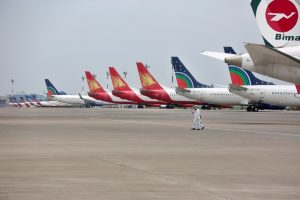U.S Ambassador to Bangladesh Dan Mozena said if his mother were in Ashulia during the tragic fire, first she would extend her most heartfelt condolences to those who lost loved ones in the fire and then search for the cloud’s silver lining.
He said, “I wish my mother were here now. She always has a way to see the bright side of things. Bangladesh needs my mother right now for indeed a heavy, dark cloud hangs over the country.”
“I believe the silver lining that she would find is perhaps that now, Bangladesh – owners, government, buyers, workers – has found renewed seriousness for dealing with workplace conditions and labour rights”, he added. The US envoy came up with the observation while addressing a conference titled “International Product Safety and Environmental Compliance” at a city hotel on Wednesday.
He said, “In the name of all of us, I want the bereaved families to know that they are in our thoughts and prayers at this most difficult time. And to those injured in the fire, please accept our best wishes for a full and speedy recovery.”
The Ambassador mentioned that Tazreen Fashion factory is a strong parallel with America’s history. In her November 29 statement on the Ashulia fire, U.S. Secretary of Labor Hilda Solis compared the Ashulia fire with the horrible fire in March 1911 at the Triangle Shirtwaist Factory in New York City that killed 146 people.”
“The horror of this 1911 fire riveted America’s attention on the dismal working conditions of the garment industry. That fire was our call to action. It galvanized support for stronger worker protections and institutions to enforce them, from workplace health and safety to workers’ right to organize and bargain collectively,” He said.
Mozena said, “I believe Secretary Solis is right in her belief that the Tazreen Fashion factory fire is a similar call to action for Bangladesh. Certainly, the Ashulia fire has sent shock waves around the world.”
He advised that action is possible on so many fronts. Some steps are obvious: installation of adequate emergency stairwells, both inside and on the exterior of the building, installation of sprinkler systems with dedicated, ample water supply, installation of a public address system throughout the factory so managers can direct workers to safe exits, installation of emergency lighting systems throughout the workplace and in the stairwells so workers don’t become disoriented in a nighttime disaster, installation of adequate fire extinguishers and training for all on how to use them so small fires can be contained, and drills, drills, drills of managers and workers on how to evacuate a factory safely in an emergency, even is some exits should be blocked. Of course, there are many other steps that can and must be taken as well.
As we discovered in America after the Triangle Shirtwaist factory fire of a hundred years ago, the key to ensuring workplace safety on a continuing basis is enabling workers to freely associate and organize so they can speak with a strong voice as a partner with factory owners and managers and with the buyers in ensuring the safety of the workplace, he suggested.
He said, “If these workers have a united voice, they can identify and help resolve workplace safety issues on a continuing basis, thus reducing the likelihood of more tragedies like the Tazreen Fashion fire.”
I believe that tragedy could herald a new era in Bangladesh of improved workplace safety, better working conditions, a stronger voice for labour, and stronger cooperation among owners, government and workers to ensure that Brand Bangladesh becomes a preferred brand, a brand associated with safe, productive factories, a brand sought by both buyers and consumers, said the American envoy.
Regarding the conference, he said, “ This conference is a positive step in that direction. This conference makes clear Bangladesh’s potential to grow even more in terms of apparel and footwear exports. Indeed, in my view, Bangladesh should be the world’s number one exporter of readymade garments, replacing China.”
“In my view, Bangladesh could be a huge player in the global market of leather and other footwear; in my view, Bangladesh should be the next Asian Tiger, the Royal Bengal Tiger”, he added.
In the conference, Mozena said:
I believe that applying the lessons learned from the Ashulia tragedy could help Bangladesh become an Asian Tiger.
Certainly, applying these lessons would help address some of the concerns raised in the long-pending petition filed by the AFL-CIO to withdraw Bangladesh’s privileges under the Generalized System of Preferences. This petition was filed in 2007 and is the longest pending GSP petition in U.S. history. The petition cites deep concerns in regard to workplace safety, the ability of workers to freely associate and organize, and the safety of those who seek to organize workers.
Three weeks ago concerned U.S. Government agencies in Washington began a review of the petition, which will be addressed one way or another in coming weeks and months. At this point, those undertaking the review are frustrated as there is little evidence that Bangladesh has undertaken any actions to address the concerns raised in the petition, such as ensuring workplace safety, registration of legitimate unions, and safeguards of those endeavouring to help unions organize.
If there is no credible evidence of Bangladesh’s engaging to resolve these concerns, then the petition may well result in the suspension of some or all of Bangladesh’s GSP privileges, which would send a powerful, negative message to RMG and other buyers in America and around the world.
I hope Bangladesh will engage seriously and constructively on the issues raised in the petition, showing progress on dealing with these concerns, so the petition can be resolved positively, without any loss of GSP privileges.
Another important step is establishing an ILO Better Work program here that will not only help Bangladesh improve and safeguard its brand but, as it has in other countries, help foster a constructive dynamic among owners, government and workers to deal with critical issues such as productivity, workplace safety, education and infrastructure needed to diversify and grow Bangladesh’s export-oriented economy.
We understand that the ILO is working with the government, you the owners and labour actors to help establish an enabling environment in which a Better Work program can be launched. This includes amendments to the existing labour law and ensuring fair, transparent and timely registration of legitimate unions.
I urge RMG and footwear owners and manufacturers, collectively and individually, to embrace Better Work’s efforts, and to use your influence with the government to create an enabling environment that will allow the International Labor Organization to launch a Better Work program in Bangladesh, a program that would be the largest in ILO’s history.
I believe that enabling the establishment of a Better Work program is a critical, needed step to take the fullest advantage of the emerging opportunity to unleash the RMG and footwear sectors by taking advantage of the once in a lifetime opportunities now before Bangladesh as these industries shift from China to new locations … In my view, these industries should be coming to Bangladesh to make real our shared vision of a prosperous, middle-income Bangladesh, the Sonar Bangla of our dreams.
As Bangladesh moves forward, as it indeed becomes the next Asian Tiger, this should not be a race to the bottom, but, as we have seen in China, a race to the top.
This means developing a diverse private sector and economy, focused on both exports and the domestic market. In addition to being the world’s largest exporter of RMG and household textiles, and a huge player in the global footwear market, Bangladesh could also loom large on the global economic stage in other areas, such as generic pharmaceuticals, frozen fish and shrimp, IT, small freighters, finished leather goods, bone china, jute products, silk, and the list goes on.
This means supporting workers’ training and enabling workers to express themselves freely and to organize themselves into legitimate unions that would work with management to ensure the safety of the workplace and the well-being of the workers. And this will mean that people in the United States and around the world will be proud to put on a shirt that says “made in Bangladesh.”
I believe Bangladesh will be the next Asian Tiger, but this is only possible if you, the owners, you, the employers, you, the buyers, you, the government, you, workers show the way.
Source (Bangla News24)




